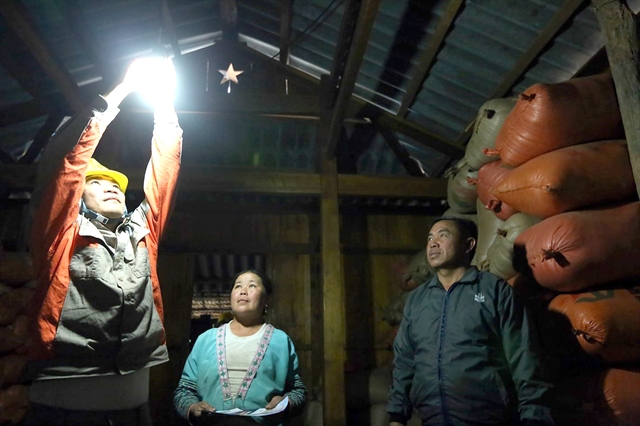 Society
Society

Local people are busy preparing for the coming Tết (Lunar New Year) celebrations, and those preparations will be a little easier this year.

|
| A worker of Điện Biên Electricity Company installs a light bulb for a local household in Mường Nhé District, Điện Biên Province. VNA/VNS Photo Phan Tuấn Anh |
ĐIỆN BIÊN — With the new year approaching, ethnic minority people in Mường Nhé District, Điện Biên Province have gotten a spark of joy and been connected to the national power grid.
Local people are busy preparing for the coming Tết (Lunar New Year) celebrations, and those preparations will be a little easier this year.
The Vietnam Electricity (EVN) project has helped link about 620 ethnic minority households in 15 villages of Mường Nhé District’s Sín Thầu, Chung Chải, Mường Nhé, Mường Toong and Pá Mỳ communes with the national grid.
Residents in Chung Chải Commune’s Hua Sin 1 and 2 villages said this year, they will have a happier Tết because they have electricity.
Previously, the villages became like ghost towns after dark but now, life has become more vibrant.
Electricity has brought new life to the villages through the sound of televisions and lights in each house.
“Everything will be brighter since the electricity is available. My children also study harder. I can also sew at night. I am very happy,” said Lầu Thị Chá, a resident from Hua Sin 1 village.
Hạng A Tà, Chá’s neigbour, said people used to use oil lamps, candles or burn firewood for light in the past.
Some families bought a generator and placed it under the stream to make use of water flow to produce electricity. But this power source was often weak and the generator could not work due to a lack of water in dry season, Tà said.
“We are so happy. Life was so hard without electricity.”
According to Hạng A Sùng, head of Hua Sin 1 Village, nearly 50 Mông ethnic households in the village are benefiting from the project that connects them to the national grid.
The lives of local residents were still very difficult and electricity was not available so people could not use radio or television, and being short of information kept them poor, Sùng said.
Now electricity is available people can buy electrical appliances for daily life and production, improving their quality of life, he said.
Trần Đức Dũng, deputy director of Điện Biên Electricity Company, said the connection was a result of a project that started in October and has been completed for more than two months.
With investment of more than VNĐ15 billion (US$645,300), the project installed 20km of electric lines and 10 transformer stations.
The journey to bring electricity to households in Mường Nhé District was not easy for the company because people live scattered across the hills, said Dũng.
Workers faced a lot of difficulties in bringing light to the villages such as weather and transportation across high passes.
But the project was completed and put into use 12 days earlier than planned, he said.
Dũng said the project aimed to support socio-economic development, guarantee security and improve the education level of the region.
The company plans to raise public awareness of safe and efficient electricity use, Dũng said.
Thào A Dề, deputy chairman of People’s Committee of Mường Nhé District, said the number of households connected to the national grid in the district has exceeded 80 per cent, with 6,500 out of 8,000 families accessing electricity.
Getting access to the national power grid will help ethnic minorities eradicate hunger, alleviate poverty, improve living standards and promote socio-economic development, Dề said. — VNS